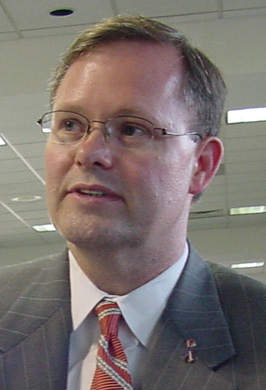After Enron, 'Change Is In The Air,' Says SEC Official

Charles D. Niemeier, chief accountant for the SEC?s Division of Enforcement and chief counsel of the Financial Fraud Task Force and a 1979 Baylor graduate.
by Alan Hunt
Accounting students at Baylor's Hankamer School of Business were told Monday by a top Securities & Exchange Commission official to take advantage of the "tremendous opportunities" that await them in a changed accounting profession.
Charles D. Niemeier, chief accountant for the SEC's Division of Enforcement and chief counsel of the Financial Fraud Task Force, said, "You are the future of the accounting profession and with the change that's in the air you are at the ground floor of a brand new era. Things are going to occur in the next few years that are going to be dramatic."
A 1979 Baylor accounting graduate and a Gatesville native, Niemeier gave the keynote address at the awards banquet of the Baylor chapter of Beta Alpha Psi, the national accounting fraternity.
He said to the SEC, Enron is simply the most recent and most dramatic in a series of financial reporting failures. But to the public it represents a pivotal event. "The public is now sensitized to the seriousness of financial fraud. And because of the change in public perception, change is in the air."
Niemeier said, however, that it was important not to overreact. "There is not a quick fix to these issues. They have been developing for some time and they cannot be fixed overnight. We need to be careful in how we deal with them."
After studying the largest financial reporting failures, he said it is rare that anyone actually intends to create a large financial fraud. "Almost always the problem begins quite subtly. Maybe it is just a little smoothing of earnings in a quarter. But once a company starts managing its earnings, it is almost impossible for it to stop, in part because the inflated results become the floor for measuring future performance."
He pointed to what he termed a growing dependence on rules. "In accounting, we have literature that would fill rooms. We have rules on top of rules. And no one person can understand all the rules. I believe there's been an overdependence on rules." He said there's nothing wrong with rules, but "we cannot be in denial about the fact that people can use rules in a way that does not achieve the results that were intended."
Niemeier said rules can be used to reach a result that is inconsistent with economic reality. He said blind adherence to rules is dangerous.
"Who would cross a train track while a train is coming, even though the cross barriers weren't down, and the warning lights weren't flashing? We are now on notice that we need to look both ways before crossing the tracks." Niemeier said in the financial reporting context, this means stepping back and applying some basic common sense tests.
"We must face the fact that there has been a train wreck, in fact several, where the warning system did not work," he said.